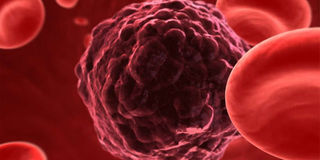Portable device can quickly detect cancer, heart disease

Cancer cell. The device will allow for both rapid diagnosis of disease and easier long-term monitoring of conditions even outside laboratory settings. PHOTO| FILE.
Researchers have developed a portable rapid diagnostic device that could be used to quickly detect cancer and cardiovascular disease.
Inspired by the fictional device the medical tricorder used in Star Trek movies, the research team set out to create a “multicorder” device.
The handheld device consists of a fingertip-sized sensor that is compatible with a user’s smartphone, enabling the two devices to communicate. It uses a low-cost chip to measure the level of metabolites in a liquid sample placed on the sensor.
While testing the device, scientists focused on four metabolite biomarkers associated with heart attack, kidney failure, and prostate cancer risk, namely: choline, xanthine, cholesterol and sarcosine.
Metabolites are small molecules that act as indicators or biomarkers for disease.
“These metabolites, proposed as potential biomarkers for acute ischaemia (for heart or brain), acute renal failure and prostate cancer, were detected in less than two minutes offering the potential to use this handheld device in clinical and non-clinical settings,” noted the research report.
BIOSENSOR PERFORMANCE
The researchers then compared device readings with results obtained from standard tests for glucose and cholesterol in the UK’s National Health Service (NHS) labs.
“Biosensor performance was validated for measurement accuracy using glucose and cholesterol by comparison to NHS certified tests for the same metabolites. All of these measurements are conducted using an independent handheld device based on chip-based technology integrated into a mobile handheld unit,” noted the report.
The two sets of results from the device and the labs did not differ significantly.
“This device promises to make the fast and accurate diagnosis of disease through the analysis of metabolites, which is otherwise confined within the laboratory. It also offers a low-cost alternative to study complex developments in different diseases,” said Prof Michael Barrett, the project co-investigator at Glasgow University.
In current medical practice, metabolites are measured in a laboratory with mass spectrometry (MS) and nuclear magnetic resonance (NMR), which are expensive and time-consuming.
In contrast to the methods currently in use, the mobile-connected device requires just a drop of prepared body fluid, such as urine or blood serum, to give a result in less than two minutes.
Scientists say the relative speed and ease of obtaining readings using the device will allow for both rapid diagnosis of disease and easier long-term monitoring of conditions even outside laboratory settings.
Researchers now plan to modify the chip to measure samples directly without the need for preparation. Scientists are also examining ways to increase the number of metabolites measured in each sample.
The findings were published in the journal Biosensors and Bioelectronics.



